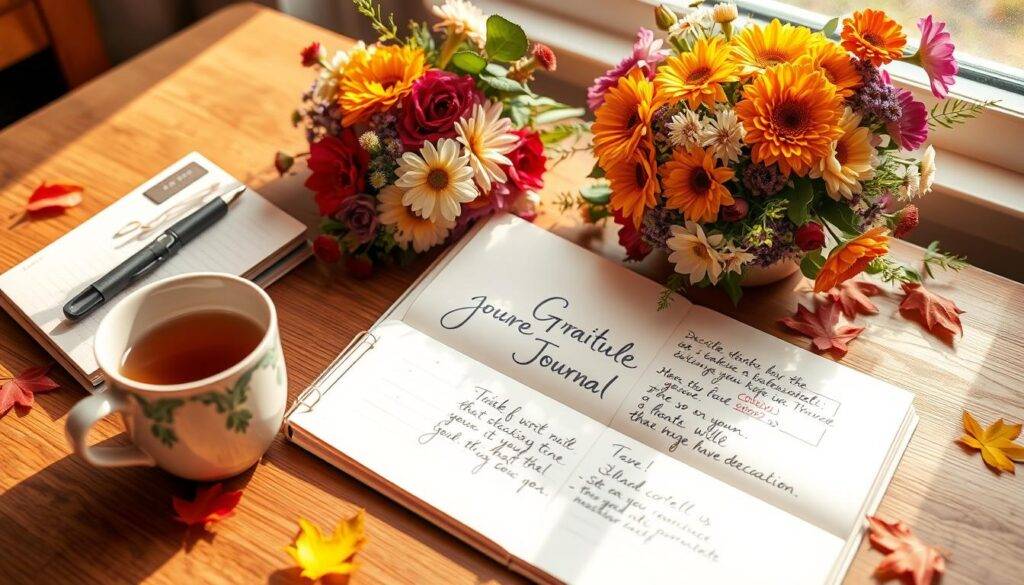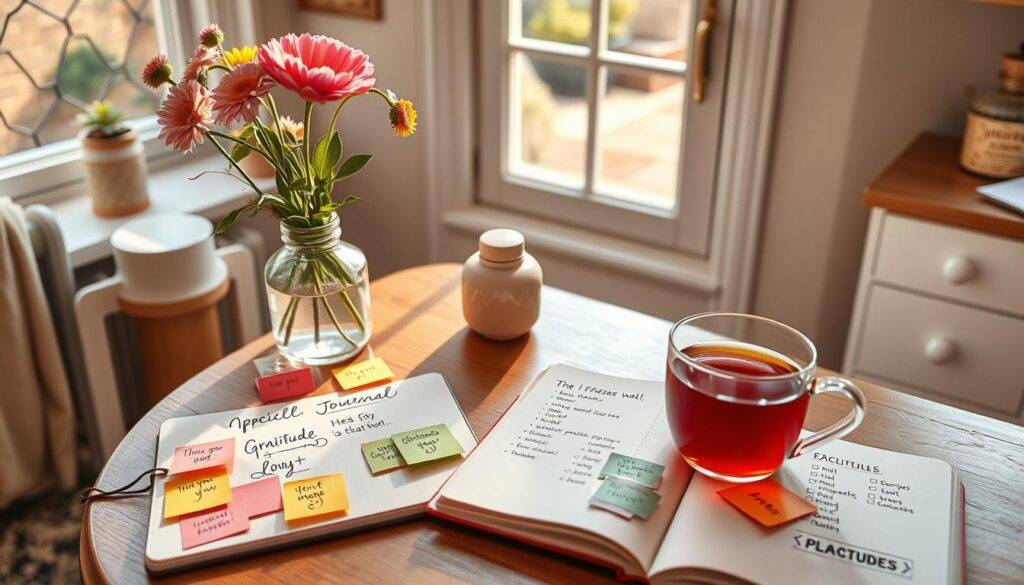“Gratitude is not only the greatest of virtues, but the parent of all the others.” – Cicero
Practicing gratitude can change your life in big ways. It helps you see the good in small things and appreciate life more. It’s about saying thanks for the positive things and recognizing how others help us.
Studies show that cultivating gratitude can make you healthier, sleep better, and feel more optimistic. It can even make you feel less lonely.
Start your journey to more daily joy here. Learn about the science of gratitude and how to make it a part of your life. See how it can change your outlook and improve your relationships.
Key Takeaways
- Practicing gratitude can have a positive impact on your mental and physical well-being.
- Expressing gratitude can strengthen your relationships and spread positivity.
- Keeping a gratitude journal is an effective way to cultivate a grateful mindset.
- Developing gratitude rituals can help make it a sustainable habit.
- Surrounding yourself with positive, grateful individuals can boost your own gratitude levels.
Understanding the Science Behind Gratitude
Gratitude is more than just a nice feeling. It’s a powerful tool that can change your life for the better. It can improve your emotional, mental, and physical health. This simple act can even change your brain, leading to many benefits.
These benefits can make you more emotionally intelligent, help you grow personally, and improve your self-reflection.
The Brain’s Response to Gratitude Practice
When you feel grateful, your brain gets happy. It starts making dopamine and serotonin, which are key for feeling good. This makes it easier to stay grateful over time.
Research-Backed Benefits of Thankfulness
Being thankful is good for you. A study showed that people who were grateful were happier than others. They also had fewer health problems.
Writing down things you’re thankful for can even help you sleep better and lower your blood pressure.
Psychological Impact on Well-being
Gratitude is also good for your mind. It can make your relationships stronger and help you feel more connected. It can even make you want to be a better person.
In romantic relationships, being thankful can make you feel closer and more satisfied. It helps you appreciate and value your relationships more.
“Gratitude is not only the greatest of virtues, but the parent of all others.”
– Cicero
Learning about gratitude can change your life. It can make you more emotionally intelligent, help you grow, and improve your self-reflection. Embracing gratitude can make you happier and healthier for a long time.
Getting Started with Daily Gratitude Practices
Starting to feel more joyful and content is easier than you think. It all begins with small steps towards gratitude. Begin by noticing how often you say “thank you” to those around you.
Every day, pick one moment to show your gratitude. It could be a small gift or a kind word. Keeping a gratitude journal helps you remember all the good things in your life.
- Reflect on past challenges to appreciate your current life more.
- Think about your relationships and how you can show more thanks.
- Share your gratitude with others to strengthen your bonds.
- Use your senses to enjoy the simple pleasures of life.
By focusing on what you have, your brain will start to look for the good more often. With regular practice, gratitude can become a natural part of who you are.
“Gratitude is not only the greatest of virtues, but the parent of all the others.” – Cicero
Studies show that being mindful and grateful can lower stress and improve your mind. It can even help prevent depression and anxiety. So, why not begin your journey to happiness today?
The Power of Gratitude Journaling
Unlocking gratitude starts with a simple practice – gratitude journaling. This tool makes you notice life’s good things. It lets you feel each moment twice. By journaling daily, you can become more positive and attract more good things into your life.
Setting Up Your Journal Practice
Start your journal by spending 7 minutes each morning. List everything you’re thankful for. This sets a positive tone for the day. Begin with simple things like a warm coffee or a beautiful sunrise. As you continue, you’ll notice more good things in your life.
Writing Prompts for Deeper Reflection
- Think about a tough experience and what you learned from it.
- Write about someone who has made a positive impact in your life and why you’re thankful for them.
- Describe a recent moment of joy or contentment.
- List your top 3 achievements, no matter how small, and why they’re important to you.
Making Journaling a Sustainable Habit
Being consistent is crucial for gratitude journaling. Even on tough days, find joy in the simple things. Studies show that regular journaling can reduce stress and anxiety and make you happier. A daily habit of gratitude can change your life for the better.

“Gratitude turns what we have into enough, and more. It turns denial into acceptance, chaos into order, confusion into clarity…it makes sense of our past, brings peace for today, and creates a vision for tomorrow.” – Melody Beattie
Start using gratitude journaling today for deeper self-reflection. Reflecting on your blessings daily can make you more positive, resilient, and joyful.
Mindful Appreciation Through Sensory Awareness
Mindfulness and sensory awareness can make your daily gratitude practice better. By paying attention to your senses, you can appreciate the small joys we often miss. These joys are hidden in the busy days of our lives.
Begin by taking a few minutes each day to focus on your senses. Try a sensory gratitude meditation. It helps you notice the sights, smells, sounds, textures, and tastes around you. Enjoy the smell of coffee, the warmth of the sun, or the songs of birds.
Being more aware of your senses can help you find gratitude even on tough days. When you’re feeling stressed, breathe deeply. Let your senses lead you to the small joys and beauty in your life.
“Appreciation is a skill set that is developed with practice. Gratitude and appreciation, although often used synonymously, have differences. Appreciation is a mindful action felt in the body with sensory awareness.”
As you grow in mindful appreciation, you’ll feel better and more satisfied with life. Studies show that appreciation can lower stress, make you more resilient, and strengthen relationships.
So, take a moment to pause, breathe, and let your senses guide you. By using mindfulness and sensory awareness, you can find joy and appreciation every day.
How to Cultivate Gratitude in Challenging Times
When things get tough, it’s easy to focus on the bad. But, cultivating a Positive Mindset and Emotional Intelligence through gratitude can help. By looking for the good, finding lessons, and growing emotionally, you can change your view. This way, you’ll appreciate the good things in your life more.
Reframe Negative Experiences
It’s normal to feel upset when things don’t go right. Instead of getting stuck on the problems, try to see things differently. Look for lessons, growth, or support from others. This shift can lessen the negative feelings and increase gratitude.
Find Silver Linings
Even in tough times, there’s usually something positive. Make it a habit to look for the good, no matter how small. Maybe you found inner strength or someone helped you out. Finding these positives can change your outlook and improve your mood.
Build Emotional Resilience
Gratitude can make you more resilient, helping you recover faster from hard times. By focusing on what you’re thankful for, you build a stronger inner strength. This not only helps you but also inspires others around you.
Remember, cultivating gratitude is a journey, not a destination. By always trying to see the good, find positives, and grow emotionally, you can find joy and fulfillment, even when things are tough.
Expressing Appreciation in Relationships
Showing gratitude in your relationships can make them stronger. It helps build emotional closeness and spreads joy. By thanking at least three people each day, you boost their self-worth and encourage them to do the same.
Both saying thanks out loud and writing it down are great ways to show you care. Handwritten notes are especially meaningful because they can be kept and read again. This makes your gratitude last longer. It not only improves your current relationships but also starts a chain of appreciation in your community.
| Relationship-Boosting Gratitude Practices | Benefits |
|---|---|
| Expressing gratitude to your partner | Couples who regularly show gratitude towards each other tend to feel more positively about their partners, according to Harvard Health research. |
| Involving children in expressing gratitude | Family involvement in gratitude practices can enhance relationships, as per the provided guidelines. |
| Changing negative conversations into gratitude sessions | This can help increase appreciation for partners, even when they are not present. |
Practicing gratitude in your relationships is a simple yet effective way to strengthen bonds, particularly during the month of November when the focus on thankfulness is heightened. By cultivating an attitude of appreciation, you can unlock the power of connection and deepen the meaningful bonds in your life.
“Gratitude leads to more spontaneous expressions of affection between romantic partners.”
Remember, the key to effective appreciation is to tailor it to the recipient’s love language, whether it’s words of affirmation, quality time, receiving gifts, acts of service, or physical touch. By expressing your gratitude in a way that resonates most with your loved ones, you can make them feel truly seen, heard, and valued.
So, make it a habit to express your appreciation, both verbally and in writing. This simple yet powerful practice can transform your relationships, fostering deeper connections, increased happiness, and a more positive outlook on life.
Creating Visual Reminders for Daily Thankfulness
In today’s world, it’s easy to get lost in daily tasks and forget to be thankful. Studies show that being grateful can make us happier and less stressed. It can even boost our immune system.1 One way to stay grateful is by using visual reminders everywhere we go.
Physical Tokens of Gratitude
Carrying a small token, like a heart-shaped stone, can remind you to be thankful. When you touch or see it, take a moment to feel grateful. These small items can help you stay thankful all day.
Environmental Cues and Triggers
You can also use your surroundings to remind you to be grateful. Hang up quotes, photos, or objects that make you thankful. Place them where you’ll see them often, like your desk or fridge.
Adding reminders of gratitude to your daily life is simple but powerful. It helps you remember to appreciate the good things. This can make you happier and more mindful of your blessings.

“Gratitude is the healthiest of all human emotions. The more you express gratitude for what you have, the more likely you will have even more to express gratitude for.” – Zig Ziglar
Research over 15 years shows that gratitude can make us happier and healthier. Keeping a gratitude journal can help you stay thankful. Try to do it every day.2
Being thankful to others can make your relationships better and make you happier. Saying thank you can greatly improve your happiness.3 Activities like gratitude meditation can also increase your sense of gratitude. Even healthcare workers have felt better after trying it.4
Visual reminders like photos or quotes can help you stay grateful, even on busy days. Keep them in places you’ll see often, like your fridge or mirror.5
- Emmons, R. A., & McCullough, M. E. (2003). Counting blessings versus burdens: an experimental investigation of gratitude and subjective well-being in daily life. Journal of personality and social psychology, 84(2), 377.
- Seligman, M. E., Steen, T. A., Park, N., & Peterson, C. (2005). Positive psychology progress: empirical validation of interventions. American psychologist, 60(5), 410.
- Lyubomirsky, S., Sheldon, K. M., & Schkade, D. (2005). Pursuing happiness: The architecture of sustainable change. Review of general psychology, 9(2), 111-131.
- Kok, B. E., Coffey, K. A., Cohn, M. A., Catalino, L. I., Vacharkulksemsuk, T., Algoe, S. B., … & Fredrickson, B. L. (2013). How positive emotions build physical health: Perceived positive social connections account for the upward spiral between positive emotions and vagal tone. Psychological science, 24(7), 1123-1132.
- Emmons, R. A., & Mishra, A. (2011). Why gratitude enhances well-being: What we know, what we need to know. Designing positive psychology: Taking stock and moving forward, 248-262.
Morning and Evening Gratitude Rituals
Gratitude can change your life for the better. Starting and ending your day with thanks can make you more positive. It helps you see the good things in your life.
Begin your day with a gratitude practice. Write down what you’re thankful for, like a warm coffee or your health. This helps you stay strong and positive.
At night, think of three things you’re thankful for. This habit makes you sleep better and feel more relaxed. Dr. Robert Emmons found that people who practice gratitude are 28% less stressed.
Doing gratitude rituals twice a day can really change your life. You’ll feel better mentally and emotionally. You’ll also be more resilient. Gratitude becomes a big part of your life.
Gratitude helps you focus on what you have, not what you don’t. Start these simple rituals. See how your Daily Habits and Gratitude Practice improve.
Developing an Attitude of Gratitude in the Workplace
In today’s fast-paced work world, it’s easy to forget the value of saying thank you. Yet, studies show that having a Workplace Gratitude mindset can boost Professional Development. It also makes the workplace a happier place.
Professional Growth Through Appreciation
When we thank others for their help, it makes their efforts seem more valuable. Feeling grateful can make us more confident and happy at work. A survey found that 93% of people think bosses who are thankful do better.
But, only 10% of people express thanks at work every day. And 60% rarely or never do. By thanking your coworkers, you can use gratitude to grow professionally.
Building Positive Team Dynamics
Being grateful every day makes us and our teams more positive. It builds trust and makes it easier to ask for help. Studies say a grateful work culture helps teams handle tough times better.
Some might worry that saying thanks too much can be taken for granted. But research shows it actually makes people feel better about themselves. This strengthens Workplace Gratitude and improves team spirit.
“Cultivating gratitude shifts focus from what one lacks to what one has.”
By making gratitude a regular part of your job, you can create a better work environment. Start by thanking your coworkers for their hard work. This simple action can change your Professional Development and team dynamics for the better.
Teaching Gratitude to Others
By being thankful, you can inspire and uplift those around you. Share your gratitude practice with family, friends, and your community. Teach kids to see the good in small things and thank those who help them.
Show others how to find gratitude in daily life. Encourage them to keep a gratitude journal or share what they’re thankful for. By doing this, you show the positive impact of Spreading Gratitude.
Remember, Positive Influence is key in teaching gratitude. By helping others be thankful, we all benefit more. Let’s create a more grateful world, one thank you at a time.
FAQ
What are the benefits of practicing gratitude?
Practicing gratitude boosts your mental health and relationships. It helps you see the small wins and appreciate the good. Studies show it can improve your immune system, sleep, and mood, and even reduce loneliness.
How does gratitude affect the brain?
Gratitude activates parts of the brain linked to happiness. It involves noticing good things and thanking others. This can make your immune system stronger, improve sleep, and boost optimism. It also makes you more helpful and less isolated.
How can I start a daily gratitude practice?
Start by noticing how often you say “thank you.” Pick one thing each day to be truly thankful for. Keep a journal to remember the good things in your life.
Think about past challenges to appreciate your current situation. Ask yourself questions about your relationships. Share your gratitude with others to strengthen bonds. Use your senses to enjoy being alive.
What are the benefits of gratitude journaling?
Journaling makes you more aware of life’s moments. It’s a simple way to focus on the positive. Write down three things you’re thankful for each day.
Use prompts to reflect deeper. Spend 7 minutes each morning listing what you appreciate. This sets a positive tone for the day and attracts more good things.
How can I use my senses to cultivate gratitude?
Try a sensory gratitude meditation. Focus on sights, smells, sounds, textures, and tastes you enjoy. This helps you appreciate the small things in life.
Even on tough days, use your senses to find gratitude. Enjoy a cup of coffee or a good book.
How can I find gratitude in difficult situations?
Look for the good in every situation. Find silver linings, like focusing on minor injuries and help received after an accident. This builds resilience and a positive outlook.
Play the appreciation game by noticing and appreciating everything during a set time each day. This can be during your commute.
How can I express gratitude to others?
Make a point to appreciate at least 3 people every day. Expressing gratitude boosts others’ self-worth and encourages them to spread positivity. Both saying and writing thanks are effective.
Written notes are especially powerful because they can be saved and re-read. This strengthens relationships and creates a cycle of appreciation.
What are some ways to create visual reminders for daily gratitude?
Carry a token of gratitude, like a heart-shaped stone or crystal, as a reminder. Touching it can help you pause and feel gratitude. Visual reminders help you stay mindful and appreciate more.
People can also be powerful reminders of gratitude. Create environmental cues that remind you to appreciate throughout your day.
How can I make gratitude a consistent habit?
Start your day with a gratitude practice to set a positive tone. Spend 7 minutes each morning writing down what you appreciate. Reflect on three things you’re grateful for in the evening.
This bookend approach keeps you grateful all day and improves sleep at night.
How can I make gratitude a consistent habit?
Start your day with a gratitude practice to set a positive tone. Spend 7 minutes each morning writing down what you appreciate. Reflect on three things you’re grateful for in the evening.
This bookend approach keeps you grateful all day and improves sleep at night.
How can I cultivate gratitude in the workplace?
Practice uncommon appreciation at work by acknowledging your colleagues’ efforts. This creates a positive work environment and improves team dynamics. Recognize both big achievements and small daily successes.
Cultivating gratitude at work can make you happier, more productive, and help you grow professionally.
How can I teach gratitude to others?
Share your gratitude practice with others to spread its benefits. Teach children and loved ones to appreciate small blessings and express thankfulness. Show them how to find gratitude in everyday situations.
Encourage others to start their own gratitude journals or join in gratitude-sharing activities. By teaching gratitude, you can make a positive impact in your community.




























































